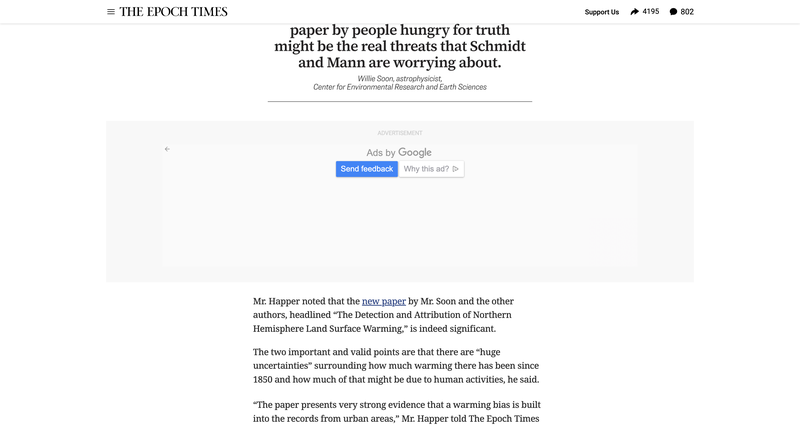Google’s billion-dollar advertising business is financing and earning revenue from website articles by The Epoch Times that challenge the existence of climate change and question its severity, a Global Witness investigation has found. We estimate that The Epoch Times webpages generated close to $1.5 million in combined revenue for Google and the website owners over the last 12 months
Our investigation reveals that Google placed advertisements alongside articles by The Epoch Times. This makes money for both Google and the website publisher.
We believe that helping The Epoch Times to monetise these articles is in breach of Google’s own publisher policies that do not allow “unreliable and harmful claims” that “contradict authoritative scientific consensus on climate change.”
How does Google monetise websites?
Monetising websites includes the process of placing adverts alongside content online to make money for website publishers and advertising technology (AdTech) companies.
If you’ve visited a website recently and noticed advertising at the top of the page, in-between paragraphs or at the side of the page, those adverts might be supplied by Google.
Google’s parent company, Alphabet, reported that its revenue from network advertising (which includes display advertising) was worth $31 billion in 2023. That’s approximately $90 for every US resident.

The Epoch Times: A known spreader of climate disinformation
The Epoch Times is a far-right newspaper that was founded in 2000 and is part of the Epoch Media Group, which has websites in 36 countries. It has built a “global-scale misinformation machine that has repeatedly pushed fringe narratives into the mainstream,” according to the New York Times.
Among the disinformation it has promoted are false messages around voter fraud and the US elections, the "Spygate" and QAnon conspiracy theories, and anti-vaccine narratives in relation to coronavirus.
On climate, the scientific fact-checking organisation Science Feedback has repeatedly challenged claims by The Epoch Times, arguing that it publishes “a range of inaccurate and misleading claims about climate change’s impacts and causes.”
Its publisher, Epoch Times Association Inc, is registered as a tax-exempt non-profit in the US and had a revenue of $128 million in 2022.
In a May 2024 investigation , we found that The Epoch Times was targeting people in the UK with adverts on Facebook and Instagram through its Epoch Times London pages that denied the existence of climate change and questioned its severity.
As a result of our work, Meta blocked Epoch Times London’s ability to post adverts on Facebook and Instagram for repeatedly violating its ad policies.
Monetising climate change denial
New evidence, collected on the 3 and 4 September 2024, shows that Google is helping The Epoch Times to generate revenue from its content, allowing adverts to be placed alongside articles that promote climate denial.
We estimate that Google’s AdTech generates approximately $960,000 a year for The Epoch Times and $450,000 a year for Google. We looked for evidence of monetisation across The Epoch Times’ Spanish, Brazilian and Global English-language websites.
We found advertisements live on 3 and 4 September 2024 for:
- A betting firm operating in Ireland and a manufacturer in Australia running next to an article that includes the claims that man-made global warming is a "hypothesis" and gives excessive weight to theories that contradict authoritative scientific consensus on climate change
- A Brazilian insurance company running next to a Portuguese language version of an article that platforms the incorrect claim that human CO2 emissions only make a small contribution to climate change
- A higher education provider in Barcelona running next to an article that promotes false claims that climate science is based on faulty temperature data

What needs to change?
Advertisers who don’t want their ads appearing next to climate denial may be left wanting by Google. While Google publicly assures its clients with policies that should prevent this from happening, our investigation shows that, left on its own, Google may not be enforcing its own rules.
This is particularly concerning given Google is one of the most powerful tech companies in the world, commanding the largest share of digital advertising revenue worldwide.
Google is providing a steady and easy-to-access revenue stream to The Epoch Times, a known promoter of climate denial, and making money for itself in the process.
The ad tech system is opaque, and some advertisers have reported finding adverts placed next to material that they would not wish to fund.
The problem goes further than Google funding websites that promote climate denial: the whole AdTech system needs to change. This reflects the views of a recent study commissioned by the European Commission that found “a strong case to reform digital advertising.”
Global Witness is calling on policymakers and legislators to further regulate ad tech, ensuring tech companies such as Google are not able to earn money from and fund articles that promote climate lies and hate.
We invited Google and The Epoch Times to comment on our findings: Google declined to comment, and The Epoch Times did not respond.
Methodology: Tracking Google’s earnings from climate denial content
We used a combination of visual and technical evidence to confirm the relationship between Google and The Epoch Times. One simple indication that there is a financial relationship is to visit a website and look at the ads that appear on the page.
If it’s a Google ad, it will have a blue sideways triangle and a cross in the corner, which if clicked will lead you to a page called “Why this ad?” on a Google website. This page details why you might have been targeted by this ad and directs you to other adverts the business is running through Google.
We also checked whether the websites in our examples listed a publisher id (also known as a ‘seller ID’) in something called an ads.txt file. This is where publishers list the AdTech companies they work with, such as Google.
As Business Insider helpfully explain, “a seller ID is essentially the AdTech equivalent of a bank account number, enabling buyers to identify the businesses they are buying from, and which ultimately denotes who is getting paid.”
When you cross-reference a publisher ID with Google’s own sellers.json file where it logs all the publishers or intermediaries it works with, it confirms the publisher ID and the relationship with the website publisher.
A search of theepochtimes.com's ad.txt file shows that Epoch Times claims a direct relationship with Google. When you cross-reference this ID with Google’s sellers.json, Google confirms the publisher ID is correct.
To estimate the potential advertising revenue generated by these websites, we used a version of the methodology previously used by the Centre for Countering Digital Hate (CCDH).
Our method uses SimilarWeb and Adpushup’s Google AdSense revenue calculator to calculate a final figure for estimated revenue across the three website addresses we analysed: theepochtimes.com, es.theepochtimes.com, epochtimes.com.br.



